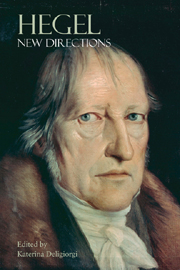Book contents
- Frontmatter
- Contents
- Contributors
- Acknowledgements
- Abbreviations
- Introduction: On reading Hegel today
- 1 Hegel on conscience and the history of moral philosophy
- 2 The apperceptive I and the empirical self: towards a heterodox reading of “Lordship and Bondage” in Hegel's Phenomenology
- 3 Hegel, McDowell and recent defences of Kant
- 4 Substance, subject and infinity: a case study of the role of logic in Hegel's system
- 5 Dialectic as logic of transformative processes
- 6 Hegel, ethics and the logic of universality
- 7 Recognition and reconciliation: actualized agency in Hegel's Jena Phenomenology
- 8 The contemporary relevance of Hegel's practical philosophy
- 9 Catching up with history: Hegel and abstract painting
- 10 New directions in Hegel's philosophy of nature
- 11 Hegel and the gospel according to Immanuel
- 12 What is conceptual history?
- 13 On Hegel's interpretation of Aristotle's psyche: a qualified defence
- Bibliography
- Index
7 - Recognition and reconciliation: actualized agency in Hegel's Jena Phenomenology
- Frontmatter
- Contents
- Contributors
- Acknowledgements
- Abbreviations
- Introduction: On reading Hegel today
- 1 Hegel on conscience and the history of moral philosophy
- 2 The apperceptive I and the empirical self: towards a heterodox reading of “Lordship and Bondage” in Hegel's Phenomenology
- 3 Hegel, McDowell and recent defences of Kant
- 4 Substance, subject and infinity: a case study of the role of logic in Hegel's system
- 5 Dialectic as logic of transformative processes
- 6 Hegel, ethics and the logic of universality
- 7 Recognition and reconciliation: actualized agency in Hegel's Jena Phenomenology
- 8 The contemporary relevance of Hegel's practical philosophy
- 9 Catching up with history: Hegel and abstract painting
- 10 New directions in Hegel's philosophy of nature
- 11 Hegel and the gospel according to Immanuel
- 12 What is conceptual history?
- 13 On Hegel's interpretation of Aristotle's psyche: a qualified defence
- Bibliography
- Index
Summary
LIBERAL POLITICS AND THE POLITICS OF RECOGNITION
Most modern liberal versions of the state depend on a philosophically ambitious theory about the nature of human individuality and its normatively relevant implications. It is often assumed that contrasting theories about the ultimacy of inter-subjective relations and the derivative or secondary status of individuality are potentially if not actually illiberal, and Hegel's putative “organic” theory of the state is often cited as an example. A major arena for such disputes has been the claim by such neo-Hegelians as Charles Taylor and Axel Honneth that the key liberal notion of the “free and rational individual” depends for its possibility on a social condition of great political relevance: “mutual recognition”. In the following, I return to the sources of this dispute (a dispute sometimes called postmodern “identity” politics) in Hegel's original arguments about “dependence” and “independence” and investigate what according to Hegel is the exact nature of the human dependence at issue and what might count as the successful satisfaction of this condition of dependence. It is, I want to argue, much easier to see what Hegel's answer is to the former question than to the latter.
We need first a general, admittedly high-altitude survey of the landscape occupied by “liberal versions of the state”. This is not easy to do; versions of liberal political theory have become ever more various. There are autonomy liberals, value-neutral liberals, sceptical liberals, relativist liberals, libertarian liberals, welfarist liberals and more recently liberal or value pluralists.
- Type
- Chapter
- Information
- HegelNew Directions, pp. 125 - 142Publisher: Acumen PublishingPrint publication year: 2006
- 3
- Cited by

